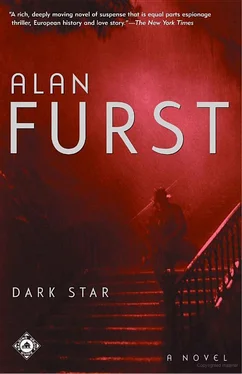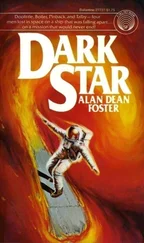Alan Furst - Dark Star
Здесь есть возможность читать онлайн «Alan Furst - Dark Star» весь текст электронной книги совершенно бесплатно (целиком полную версию без сокращений). В некоторых случаях можно слушать аудио, скачать через торрент в формате fb2 и присутствует краткое содержание. Жанр: Шпионский детектив, на английском языке. Описание произведения, (предисловие) а так же отзывы посетителей доступны на портале библиотеки ЛибКат.
- Название:Dark Star
- Автор:
- Жанр:
- Год:неизвестен
- ISBN:нет данных
- Рейтинг книги:3 / 5. Голосов: 1
-
Избранное:Добавить в избранное
- Отзывы:
-
Ваша оценка:
- 60
- 1
- 2
- 3
- 4
- 5
Dark Star: краткое содержание, описание и аннотация
Предлагаем к чтению аннотацию, описание, краткое содержание или предисловие (зависит от того, что написал сам автор книги «Dark Star»). Если вы не нашли необходимую информацию о книге — напишите в комментариях, мы постараемся отыскать её.
Dark Star — читать онлайн бесплатно полную книгу (весь текст) целиком
Ниже представлен текст книги, разбитый по страницам. Система сохранения места последней прочитанной страницы, позволяет с удобством читать онлайн бесплатно книгу «Dark Star», без необходимости каждый раз заново искать на чём Вы остановились. Поставьте закладку, и сможете в любой момент перейти на страницу, на которой закончили чтение.
Интервал:
Закладка:
By the time he left Cracow he’d been a socialist, a radical socialist, a communist, a Bolshevik, and a revolutionary in all things- whatever one might become to oppose the czar, for that mattered above all else.
After Kishinev, where, as a six-year-old, he’d heard the local citizens beating their whip handles on the cobblestones, preparing their victims for a pogrom, after Odessa, where he’d found his father half buried in a mud street, a pig’s tail stuffed in his mouth- thus we deal with Jews too good to eat pork- what else?
For the pogroms were the czar’s gift to his peasants. There was little else he could give them, so, when they were pressed too hard by misery, when they could no longer bear their fate in the muddy villages and towns at the tattered edges of the empire, they were encouraged to seek out the Christ-killers and kill a few in return. Pogroms were announced by posters, the police paid the printing bills, and the money came from the Interior Ministry, which acted at the czar’s direction. A pogrom released tension and, in general, evened things up: a redistribution of wealth, a primitive exercise in population control.
Thus the Pale of Settlement produced a great number of Szaras. Intellectuals, they knew the capitals of Europe and spoke their languages, wrote fiercely and well, and had a great taste and talent for clandestine life. To survive as Jews in a hostile world they’d learned duplicity and disguise: not to show anger, for it made the Jew-baiters angry, even less to show joy, for it made the Jew-baiters even angrier. They concealed success, so they would not be seen to succeed, and learned soon enough how not to be seen at all: how to walk down a street, the wrong street, in the wrong part of town, in broad daylight-invisible. The czar was in much more trouble than he ever understood. And when his time came, the man in charge was one Yakov Yurovsky, a Jew from Tomsk, at the head of a Cheka squad. Yurovsky who, while an emigre in Berlin, had declared himself a Lutheran, though the czar was in no position to appreciate such ironies.
Having lived in a mythical country, a place neither here nor there, these intellectuals from Vilna and Gomel helped to create another and called it the Union of Soviet Socialist Republics. Such a name! It was hardly a union. The Soviets-workers’ councils- ruled it for about six weeks; socialism impoverished everybody, and only machine guns kept the republics from turning into nations. But to Szara and the rest it didn’t matter. He’d put his life on the line, preferring simply to die at the wrong end of a gun rather than the wrong end of a club, and for twelve years-until 1929, when Stalin finally took over-he lived in a kind of dream world, a mythical country where idealistic, intellectual Jews actually ran things, quite literally a country of the mind. Theories failed, peasants died, the land itself dried up in despair. Still they worked twenty hours a day and swore they had the answer.
It could not last. Who were these people, these Poles and Lithuanians, Latvians and Ukrainians, these people with little beards and eyeglasses who spoke French down their big noses and read books? asked Stalin. And all the little Stalins answered, We were wondering that very thing, only nobody wanted to say it out loud.
The steady rain beat down on Berlin; somewhere in the house the landlady’s radio played German opera, the curtains hung limp by the window and smelled of the dead air in a disused attic room. Szara put on his belted raincoat and walked through the wet streets until he found a telephone box. He called Dr. Julius Baumann and managed to get himself invited to dinner. Baumann sounded suspicious and distant, but Nezhenko’s telegram had been specific: the information was wanted by 25 November. There was no Soviet press bureau in Berlin, he’d have to file through the press office at the embassy, and 25 November was the next day. So he’d given Baumann a bit of a push-sometimes finesse was a luxury.
He walked slowly back to the tall house and spent the afternoon with the Okhrana, DUBOK, the Caspian Oil Company, and thirty-year-old treffs in the back streets of Tbilisi, Baku, and Batum. They wanted him to be an intelligence officer and so he was. Fearless, heroic, jaw set with determination, he read reports for five hours in an anonymous room while the rain drummed down and he never once dozed off.
The Villa Baumann stood behind a high wall at the edge of the western suburbs, in a neighborhood where gardeners pruned the shrubbery to sheer walls and flat tabletops and architects dazzled their clients with turrets and gables and gingerbread that made mansions seem colossal dollhouses. A yank at the rope of a ship’s bell by the gate produced a servant, a stubby man with immense red hands and sloping shoulders who wore an emerald green velvet smoking jacket. Mumbling in a dialect Szara could barely understand, he led the way down a path that skirted the Villa Baumann and ended at a servant’s cottage at the rear of the property, then tramped off, leaving Szara to knock at the door.
“I take it Manfred showed you the way,” Baumann said dryly. “Of course this used to be his”-the cottage was small and plain, quite pleasant for a servant-“but the new regime has effected a more, ah, even-handed approach to domicile, who shall live where.”
Baumann was tall and spare, with thin, colorless lips and the face, ascetic, humorless, of a medieval prince or monastic scholar. His skin was white, as though wind or sun had never touched it. Perhaps fifty, he was hairless from forehead to crown, which drew attention to his eyes, cold and green, the eyes of a man who saw what others did not, yet did not choose to say what he saw. Whatever it was, however, faintly displeased him, that much he showed. To Szara, German Jew meant mostly German, a position of significant hauteur in the Central European scheme of things, a culture wherein precise courtesies, intellectual sophistication, and quiet wealth all blended to create a great distance from Russian Jews and, it was never exactly expressed, most Christians.
Yet Szara liked him. Even as the object of that jellyfish stare down a long, fine, princely nose- who are you? — even so.
They were four for dinner: Herr Doktor and Frau Baumann, a young woman introduced as Fraulein Haecht, and Szara. They ate in the kitchen-there was no dining room-at a rickety table covered by a dazzling white damask cloth embroidered with blue and silver thread. The porcelain service showed Indian princes and thick-lipped, gold-earringed princesses boating on a mountain lake, colored tomato red and glossy black with gold filigree on the rims. At one point, the tines of Szara’s fork scraped across the scene and Frau Baumann closed her eyes to shut out the sound. She was a busy little pudding of a woman. A princess with a dowry? Szara thought so.
They ate poached salmon fillets and a rice and mushroom mixture in a jellied ring. “My old shop still serves me,” Frau Baumann explained, the unspoken of course perfectly audible. “During the hours of closing, you understand, Herr Szara, at the door in the alley. But they still do it. And they do cook the most lovely things and I am enough the domestic to reheat them.”
“A small premium is entailed,” Baumann added. He had a deep, hollow voice that would have been appropriate for the delivery of sermons.
“Naturally,” Frau Baumann admitted, “but our cook …”
“A rare patriot,” said Baumann. “And a memorable exit. One would never have supposed that Hertha was capable of giving a speech.”
“We were so good to her,” said Frau Baumann.
Szara sensed the onset of an emotional flood and rushed to cut it off. “But you are doing so very well, I haven’t eaten like this …”
Читать дальшеИнтервал:
Закладка:
Похожие книги на «Dark Star»
Представляем Вашему вниманию похожие книги на «Dark Star» списком для выбора. Мы отобрали схожую по названию и смыслу литературу в надежде предоставить читателям больше вариантов отыскать новые, интересные, ещё непрочитанные произведения.
Обсуждение, отзывы о книге «Dark Star» и просто собственные мнения читателей. Оставьте ваши комментарии, напишите, что Вы думаете о произведении, его смысле или главных героях. Укажите что конкретно понравилось, а что нет, и почему Вы так считаете.












